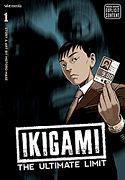 Motoro Mase’s Ikigami: The Ultimate Limit (Viz) has one of the more chilling opening sequences I’ve read recently. A group of first-graders are attending their school’s opening ceremonies. They receive their vaccinations from a team of smiling nurses. Then the principal lets the other shoe drop: some of them won’t live to be adults.
Motoro Mase’s Ikigami: The Ultimate Limit (Viz) has one of the more chilling opening sequences I’ve read recently. A group of first-graders are attending their school’s opening ceremonies. They receive their vaccinations from a team of smiling nurses. Then the principal lets the other shoe drop: some of them won’t live to be adults.
The principal knows this because a very small percentage of the vaccinations include a nanotech device that will kill them sometime in their late teens or early twenties. The government has concocted this scheme “to instill a fear of death into the citizens of our peaceful society… so as to encourage them to value life.” It’s absurd, but it’s creepy at the same time.
A lot of creators would soften the absurdity by fabulizing the setting – storm-trooper cops, hover cars, a memorial hologram where Mount Fuji used to be. Mase keeps things flat and entirely recognizable, aside from a government that tries to teach perspective by randomly murdering .1% of the people it serves. He even devotes an unexpected but welcome number of pages to the bureaucracy that runs the nano-death system. The pedestrian details of the system of blinds between agencies and the management of the soon-to-be deceased actually add to the eeriness.
The story is framed around one of those bureaucrats, Fujimoto. He delivers “death cards” to the unfortunates 24 hours before their microscopic time bomb is set to go off. Fujimoto seems to take his work seriously more for the benefit of the condemned than out of belief in the system. He even demonstrates a small amount of skepticism as to its logic and value, though it isn’t really his story, at least not yet.
Mase’s primary interest lies with the condemned, exploring how different personalities will react to the knowledge that, through no fault of their own, they have one day to live. First is a brutally bullied nebbish who seeks revenge on the classmates who abused and humiliated him. Second is a young musician who abandoned his friend and partner for a career opportunity. The drama is more ostentatious here than the bits about how the system works, and it’s strangely less compelling.
I have no idea if Ikigami will evolve into a series about a moral struggle against the death-card system or if it will continue to extrapolate on the experiences of the recipients. If it’s the former, it could be something really special. If it’s the latter, I’ll probably keep reading for the inter-office memos.
